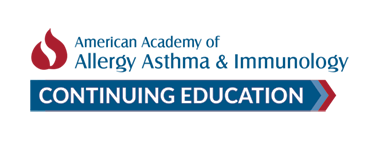1002: NIEHS: Understanding the Exposome: Allergens, Adjuvants and Non-Allergens
![]() This course is part of the 2018 Virtual Joint Congress. Want more virtual meeting recordings? Save by ordering the full set! This session is related to the 2018 Clinical Theme.
This course is part of the 2018 Virtual Joint Congress. Want more virtual meeting recordings? Save by ordering the full set! This session is related to the 2018 Clinical Theme.
Session 1002 from the 2018 AAAAI/WAO Joint Congress includes the following talks:
- Allergen Detection and Standardization
- The Influence of Pollution Exposure on Allergic Sensitization
- The Immune Response to Allergens and Non-Allergens
- Are Allergens More Abundant and/or More Stable Than Other Proteins?
- The Influence of Environmental Factors on Allergens and Antibody Recognition
AMA PRA Category 1 Credits™: 2.50
CE: 2.50
Credit must be claimed by May 31, 2020. Any credit request on or after June 1, 2020 will be subject to an administrative fee.
Target Audience
Physicians
Allergists/Immunologists
Nurses
Nurse Practitioners
Allied Health Professionals
Learning Objectives
Upon completion of this activity, participants should be able to:
- Discuss the totality of human exposure and how this influences allergic disease
- Describe the molecular mechanisms of allergic sensitization using a holistic view of allergen, adjuvant and non-allergen exposure
- Identify environmental influences on the antibody recognition of allergens
Faculty
Juan C. Celedon, MD DrPH FAAAAI
Children's Hospital of Pittsburgh, Pittsburgh, PA
Relevant relationships: none
Maksymilian Chruszcz, PhD
University of South Carolina, Columbia, SC
Relevant relationships: none
Geoffrey Mueller, PhD
NIEHS, Research Triangle Park, NC
Relevant relationships: none
Bjoern Peters, PhD
La Jolla Institute for Allergy and Immunology, San Diego, CA
Relevant relationships: none
Anna Pomés, PhD FAAAAI
INDOOR Biotechnologies, Inc., Charlottesville, VA
Relevant relationships: none
Euan R. Tovey, MSc PhD
Woolcock Institute of Medical Research, Sydney, Australia
Relevant relationships: none
Reviewers
Maria Crain, RN MA CPNP
Children's Medical Center Dallas, Dallas, TX
Relevant relationships: none
AAAAI Disclosure Policy
Pursuant to the Code of Ethics for the American Academy of Allergy, Asthma & Immunology (AAAAI) and the Standards for Commercial Support of Continuing Medical Education of the Accreditation Council for Continuing Medical Education, the AAAAI requires disclosure of certain information from faculty members of educational activities designated for CME credit by the AAAAI. Prior to the activity, authors and reviewers are required to disclose all relationships that meet the following parameters:
- Employment. Name of employer and job title.
- Financial interests. All organizations, other than the employer, from which the faculty member or a member of his/her immediate family or household receives annual remuneration in any amount (including grants, honoraria and consulting fees).
- Research interests. All organizations which support research projects for which the faculty member or member of his/her immediate family or household serves as an investigator.
- Legal Consultation Services/Expert Witness Testimony: All topics on which the faculty member provided legal consultation and/or expert witness testimony during the previous calendar year.
- Organizational interests: All organizations, other than the AAAAI, for which the faculty member holds volunteer positions.
- Gifts. All organizations from which the faculty member or a member of his/her immediate family or household have received a gift of any amount in the last year.
- Other interests. All interests of the faculty member or a member of his/her immediate family or household that would be judged by a majority of his/her peers to be more than casual and/or likely to impact his/her ability to exercise independent judgment. This includes any financial interest in or relationship with any manufacturer of a commercial product, and any financial interest or relationship with any organization that provides commercial support to AAAAI-sponsored educational activities.
The information disclosed by the speakers and planning committee was reviewed in accordance with the AAAAI Disclosure Policy. All potential conflicts of interest were resolved by the planners, faculty, and reviewers prior to their participation in the development of this activity
Accreditation Statement
This activity has been planned and implemented in accordance with the accreditation requirements and policies of the Accreditation Council for Continuing Medical Education (ACCME) through the joint providership of AAAAI and the World Allergy Organization. The AAAAI is accredited by the ACCME to provide continuing medical education for physicians.
Designation Statement
The American Academy of Allergy, Asthma & Immunology designates this enduring material for a maximum of 2.50 AMA PRA Category 1 Credits™. Physicians should claim only the credit commensurate with the extent of their participation in the activity.
CE Designation Statement
The American Academy of Allergy, Asthma, & Immunology (AAAAI) is a Provider, approved by the California Board of Registered Nursing, Provider #10704, for up to 2.50 Contact Hours.
Credit Claiming Period
Credit claiming for this activity will expire at 11:59 pm on May 31, 2020. Requests to claim credit on or after June 1, 2020 will be denied.
AAAAI Privacy Policy
To verify your participation in educational activities, you may be asked to provide your name, contact information, and/or other descriptors. The AAAAI will not release this information to outside entities. It may be used internally to inform you of other AAAAI educational activities. If you wish to have your information excluded from this process, please contact us at [email protected].
Questions
Activity-related questions should be directed to [email protected].
Available Credit
- 2.50 AttendanceAttendance credit.
- 2.50 CECE credit.
- 2.50 CMECME credit.

 Facebook
Facebook X
X LinkedIn
LinkedIn Forward
Forward